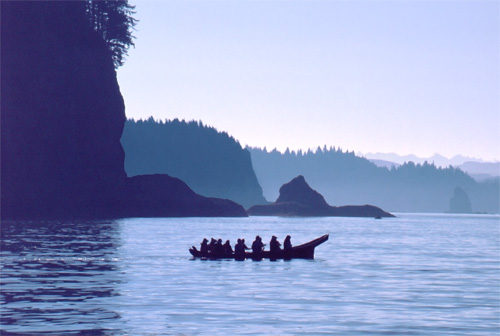
COASTAL TRIBES CONVENE TO TACKLE CLIMATE CHANGE
July 25, 2012
How climate change affects U.S. indigenous coastal cultures was the focus of the First Stewards symposium with the coastal treaty tribes of Washington state – the Hoh, Makah, Quileute tribes and the Quinault Indian Nation – hosting the event and collaborating with NOAA and other partners.
A crew in a traditional Northwest Canoe approaches the Hoh River on the Olympic Peninsula in Washington. Ocean canoes of the Northwest are made from Western red cedar trees as old as 1,000 years. Their great size and abundance made the Northwest Canoe culture possible.
In Alaska, there are native villages pulling up stakes and moving to new ground as the permafrost beneath them melts and erodes due to warming global temperatures. Mike Williams is an Iditarod racer, a subsistence hunter, a veteran of the US Army and chief of the Yupiit Nation. He’s also a wellness counselor in the rural village of Akiak, where he lives. The village, like many in Alaska, is losing ground to erosion as the permafrost melts and storms surge due to climate change. Williams was the moderator for the panel of Alaskans who came to testify last week at First Stewards climate symposium. They represented rural villages from the coasts and interior of Alaska, all of which are under threat. Akiak lost the regional hospital and staff housing that dates back to the 1900s, Williams said. Even more devastating was the loss of the cemetery. Workers from the village spent a whole summer relocating the remains of ancestors to higher ground. Williams said he spent a lot of time talking with people from his village about their anxiety and grief as they worked with the remains. Symposium attendees also heard from United States Senator Mark Begich (D-AK) who said he has first-hand experience with climate change. He told about a photo of himself as a child, sitting in front of a big glacier calving behind him. Recently he took his young son to the same place, and took the same picture – but there was no glacier, only snow-capped mountains in the distance. Other members of the Alaska panel were: Erin Dougherty, an attorney for the Native American Rights Fund; Stanley Tom, from Newtok, a village that is in the process of relocating at higher ground; Stanley Tocktoo, from Shishmare; and Pat Plentikoff, from St. George. “Coastal indigenous people have thousands of years of rich, place-based knowledge of climate change and its effects on humans, and how to adjust to these changes,” said Daniel J. Basta, director, NOAA’s Office of National Marine Sanctuaries. He said their experience is extremely valuable and can help all of us as the world looks for ways to adapt. “We need everyone engaged in working on adaptations, mitigation, strategies, and solutions to climate change,” said Micah McCarty, chairman of the Makah and of the First Stewards organizing committee. “Even the polar bears and people of the Arctic Circle cannot escape the second-hand smoke of the vehicle tailpipe and the smokestack that leave such a large carbon footprint.” “Coastal Indian people are already dealing with the effects of climate change,” said Billy Frank Jr., chairman of the Northwest Indian Fisheries Commission. “The glaciers that feed our life-giving rivers are melting. Reservations are flooding more often, forcing some tribes to have to move their homes to higher ground. Tribes are the natural choice to lead the nation in the response to climate change.” United States Senator Lis Murkowski (R-AK) used her opening remarks in a Senate Committee hearing on Indian Affairs on July 19th, to educate those in the hearing about the coastal damage being faced on Alaska’s coastline. “There are a great number of small Alaska coastal villages that are in danger … how we act to provide a level of adaptation to move them, these are significant struggles for us,” said Murkowski. “It is moving people who have lived somewhere for thousands of years, but also the cost is extraordinary.” Murkowski reminded the Environmental Protection Agency during the hearing that federal consultation with Alaska Native Tribes is not optional, as she pressed the EPA for greater collaboration with Alaska’s First People. The First Stewards climate symposium (July 17 through the 20th) was held in partnership with scientific, tribal, governmental and non-governmental organizations, including the Smithsonian National Museum of the American Indian, NOAA’s Office of National Marine Sanctuaries, NOAA’s National Marine Fisheries Service, The Nature Conservancy, Northwest Indian Fisheries Commission and the Western Pacific Regional Fishery Management Council. Other partners included the Salmon Defense, National Congress of American Indians, United South and Eastern Tribes, Uncas Consulting Services, and EA Engineering, Science, and Technology.
Edited by Mary Kauffman, SitNews
On the Web:
Source of News:
E-mail your news &
photos to editor@sitnews.us
|
||
